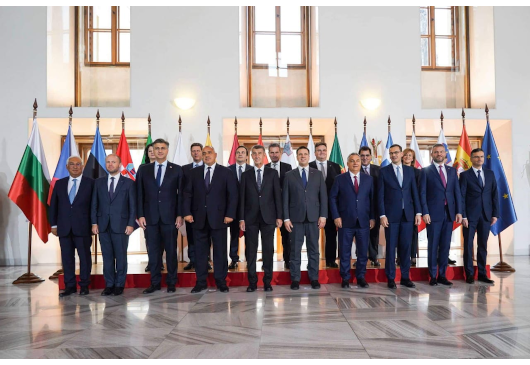 A Joint Declaration on maintaining the level of funding for traditional policies, and in particular Cohesion Policy, in the new long-term EU budget was today adopted in Prague by the high-level representatives of the 17 member states participating in the Friends of Cohesion Group. Alternate Minister of Foreign Affairs Miltiadis Varvitsiotis represented the Prime Minister of Greece at the Summit.
A Joint Declaration on maintaining the level of funding for traditional policies, and in particular Cohesion Policy, in the new long-term EU budget was today adopted in Prague by the high-level representatives of the 17 member states participating in the Friends of Cohesion Group. Alternate Minister of Foreign Affairs Miltiadis Varvitsiotis represented the Prime Minister of Greece at the Summit.
The Declaration sets out the will of the 17 member states to ensure a strong EU Cohesion Policy and to secure funding for the next programming period. Special emphasis was put on the decisive contribution of the Cohesion Policy to reducing inequalities in the Peripheries, as it has bolstered job creation, infrastructure and competitiveness.
In his remarks, the Alternate Minister of Foreign Affairs sent a clear message regarding Greece’s position on the proposed reduction in funding for traditional EU policies. “We are asking Europe to continue to fund policies that change our lives, with infrastructure projects that contribute to growth, so that the poorest regions can converge with the European average,” he stated. Mr. Varvitsiotis noted that the Cohesion Policy and the Common Agricultural Policy initially absorbed about 80% of the EU budget, a percentage that gradually fell to 71% in the context of the current budget. “We believe that the total size of the MFF should come to 1.3% of the GDP of the EU-27, as expressed by the European Parliament, and that spending should be determined according to the spending needs of the EU,” he stressed.
Referring to the ten-year crisis suffered by Greece, which saw its GDP fall by 25%, Mr. Varvitsiotis argued that maintaining funding for traditional policies at current levels provides significant “added value” in the lives of citizens. He underscored that the proposed further reduction of the relative share of the budget for both policies in the next MFF will have a negative impact on its effective implementation. “So it is necessary to maintain at least the current level of funding, in real terms, for the cohesion policy and the CAP in order to ensure their effective implementation,” he said on the issue, concluding that “there is a clear need for special provisions for the member states facing serious economic recession. Greece should be exempted from the proposed ceiling of 8% for the increase of cohesion funds in the next MFF.”
Finally, at the luncheon following the meeting, Mr. Varvitsiotis once again had the opportunity to highlight the migration issue, stressing that it is not a problem Greece is facing alone, but a problem that concerns the whole Union.
Mr. Varvitsiotis noted that Turkey’s exploitation of the migration issue concerns the whole of Europe. “Turkey’s threats to increase migration flows are threats against the whole European Union, and not just against Greece. This is a European problem, not a bilateral problem,” he underscored. Concluding, he said that the Union needs to find ways to return migrants not eligible for asylum to third countries, giving the example of Bangladesh. Specifically, he argued that the European Union is implementing development assistance programmes for various third countries, including Bangladesh, while it should combine these programmes with readmission agreements so that these countries can take back their citizens.
November 5, 2019


